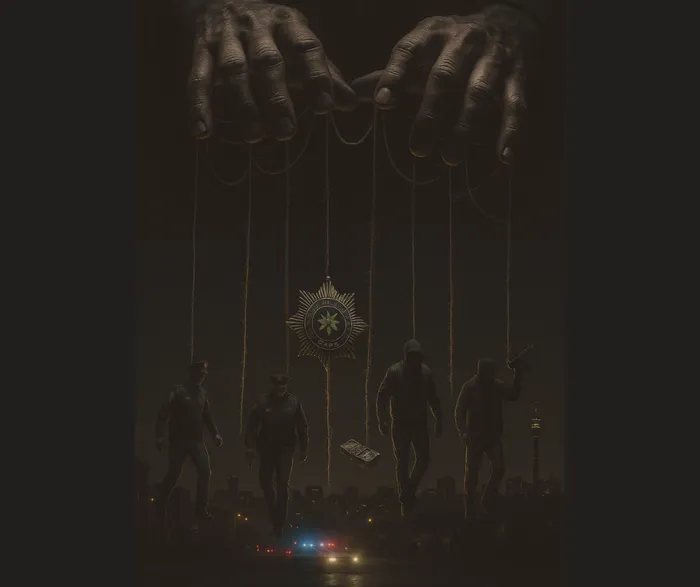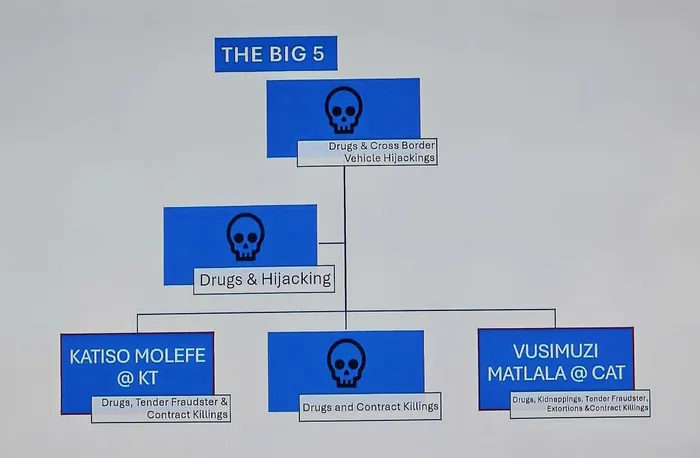
A grim picture of the Big 5 crime cartel's operations has emerged. It is centred primarily in Gauteng—chosen for its economic advantages—the Big 5 reportedly traffic drugs while engaging in cross-border vehicle hijackings, kidnappings, tender fraud, and extortion
Image: Sora/AI
Serious concerns have rippled through South African communities following revelations of a sophisticated crime cartel allegedly infiltrating the South African Police Service (SAPS), eroding public trust, and heightening fears for safety.
The shocking disclosures came to light on eighth day of the Madlanga Commission last month, when Crime Intelligence head Dumisani Khumalo provided vital testimony about a significant organized crime syndicate dubbed the "Big 5”consisted of five key individuals Vusimuzi “Cat” Matlala and Katiso "KT" Matlala.
According to Khumalo, this cartel has noticeably embedded itself within criminal networks and the country's political, economic, and law enforcement structures.

Inside the 'Big 5': Criminal Capture of South Africa's Police Service Exposed
Image: X
He painted a grim picture of the cartel's operations: centred primarily in Gauteng—chosen for its economic advantages—the Big 5 reportedly traffic drugs while engaging in cross-border vehicle hijackings, kidnappings, tender fraud, and extortion.
The syndicate allegedly includes controversial tenderpreneurs Vusimuzi “Cat” Matlala, Katiso “KT” Molefe, and other unidentified figures with significant influence.
“The cartel is sophisticated and deeply entrenched,” Khumalo said in his testimony at the commission probing alleged criminal capture of the justice system.
The impact of this alleged infiltration resonates deeply in some of the affected communities.
Henry Myataza, a property developer and resident of Daveyton, expressed frustration over the police’s inability or unwillingness to handle drug-related crime.
“One of the biggest challenges we have is drugs that are easily accessible in our communities, especially among young people…
“Several times we have tried to bring this attention to the police, but nobody gets arrested. When arrests do happen, those who report are often threatened,” Myataza said.
“Whistleblowers are scared to speak out. Really, the police are not doing enough.”
Echoing this sentiment, local hailing driver and Daveyton resident Lunga Davashe pointed to slow police response times and rising crime rates, which are forcing young adults to patrol the streets themselves.
“My father was a Captain in the police, so i understand how difficult it is to fight crime when colleagues don’t support each other. Many people have lost faith in the SAPS,” he explained.
“As a community, we try to protect ourselves, but it’s hard when some have jobs and other commitments. I think even the good police officers feel discouraged in this environment.”
Raymond Methraj Sakloo, Public Relations Officer for Community Police Forums in the eThekwini region, emphasised how internal power struggles have taken precedence over serving the public.
“While they muscle against each other, the people we serve continue to suffer,” Sakloo said.
“This indicates that ordinary people are not a priority within the SAPS. Power and internal disputes drive the feud, leaving all of us caught in the incompetence displayed by the police.”
He added that several families in Durban South have approached him after their police cases failed to progress, reinforcing a common theme of stalled justice and ineffective policing.
Specialist Investigator Mike Bolhuis, founder of Specialised Security Services, highlighted the corrosive effects of police corruption in a published report on his website.
“Corruption within SAPS continues to undermine public trust, obstruct justice, and weaken national security,” Bolhuis wrote.
“Public confidence collapses, discouraging victims from reporting crimes or testifying. Honest officers feel betrayed by leadership failures. Judicial outcomes are tainted with evidence chains destroyed and prosecutions weakened.”
He warned that a criminal justice system depends on trustworthy frontline defenders—a system currently compromised when officers themselves engage in criminal conduct.
According to a 2025 report published by Corruption Watch authored by Melusi Ncala, in 2025, bribery accounts for about 33% of police corruption cases reported.
Examples include officers soliciting bribes from motorists for arbitrary reasons, sometimes demanding thousands of rand, particularly in regions like Gauteng, where bribery cases make up 47% of complaints in that province.
The report stated that common corrupt practices include abuse of power and failure to act, with bribery, abuse of power, and inability to act reported at rates of 33%, 23%, and 18% respectively, among police corruption cases.
Earlier in March, Corruption Watch also revealed that the national victimisation surveys identified traffic police as the government service most strongly associated with graft (see table below).
The 2022/23 Stats SA Governance, Public Safety and Justice Survey revealed that more traffic officials than any other government officials asked individuals for bribes in 2019/20 and 2022/23.
According to Corruption Watch, six national surveys conducted since 2003 that asked about bribery identified traffic police as the government service most frequently linked to corruption.
National victimisation surveys have repeatedly identified traffic police as the government service most strongly associated with graft (see table).
The 2022/23 Stats SA Governance, Public Safety and Justice Survey revealed that more traffic officials than any other government officials asked individuals for bribes in 2019/20 and 2022/23.
thabo.makwakwa@inl.co.za
IOL Politics

A grim picture of the Big 5 crime cartel's operations has emerged. It is centred primarily in Gauteng—chosen for its economic advantages—the Big 5 reportedly traffic drugs while engaging in cross-border vehicle hijackings, kidnappings, tender fraud, and extortion
Image: IOL Graphics
Related Topics: